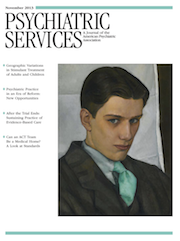“Assisted Outpatient Treatment”: An Example of Newspeak?: In Reply
In Reply: Roskes claims that “assisted outpatient treatment” and “involuntary outpatient commitment” are the same and accuses us of making “a deliberate attempt to make the intervention seem less coercive and therefore more palatable.” In fact, the term “assisted outpatient treatment” was coined by one of us (JS) in collaboration with the staff of the Treatment Advocacy Center to differentiate it from involuntary outpatient commitment. The difference is subtle but important.
To illustrate: take two people with active tuberculosis who refuse their prescribed antituberculosis medication and are thus potentially dangerous to other people. The first doesn’t like the side effects and therefore refuses it. The second has Alzheimer’s disease and anosognosia and refuses because he doesn’t think he has tuberculosis and believes the nurse is trying to poison him. In many states, public health laws permit the involuntary medication of both individuals.
In the first case, we assume that the man has a normally functioning brain and can make informed choices. Forcing him to take medication is truly involuntary treatment. In the second, we know that the man does not have a normally functioning brain and suspect he cannot make informed choices. Forcing him to take medication is assisting him to make the choice we think he would make if he had a normally functioning brain.
Most individuals with serious mental illness on assisted outpatient treatment have anosognosia. There are now 20 neuroimaging studies showing subtle differences between the brains of individuals with schizophrenia who have anosognosia and those who do not. A recently published study, done on postmortem brains, even shows oligodendrocyte cellular differences between brains of individuals with and without anosognosia (1). Another factor that differentiates assisted outpatient treatment from truly involuntary treatment is that many individuals are retrospectively grateful that they received assisted outpatient treatment. In an assessment of Kendra’s Law, for example, 81% of individuals surveyed said that assisted outpatient treatment had helped them get and stay well (2). Individuals subjected to truly involuntary treatment are rarely retrospectively grateful.
It is unfortunate that Roskes practices in Maryland, one of only five states without an assisted outpatient treatment law. He thus has not had an opportunity to observe its proven effectiveness in reducing rehospitalization, victimization, incarceration, homelessness, and violent behavior (3). In addition, two studies have now shown that the use of assisted outpatient treatment results in significant cost savings to states (4,5).
1 : Reduced oligodendroglial density in the inferior parietal lobule and lack of insight in schizophrenia. European Journal of Psychiatry 27:111–121, 2013Crossref, Google Scholar
2 Kendra’s Law: Final Report on the Status of Assisted Outpatient Treatment. Albany, New York State Office of Mental Health, March 2005Google Scholar
3 : American Psychosis: How the Federal Government Destroyed the Mental Illness Treatment System. New York, Oxford University Press, 2013Google Scholar
4 : Assisted outpatient treatment: preventive, recovery-based care for the most seriously mentally ill. Resident’s Journal 7(6):16–18, 2012. Available at psychiatryonline.org/data/Journals/AJP/23626/ajp_169_n6_ResJournal.pdfGoogle Scholar
5 : The cost of assisted outpatient treatment: can it save states money? American Journal of Psychiatry (Epub ahead of print, July 30, 2013)Google Scholar



